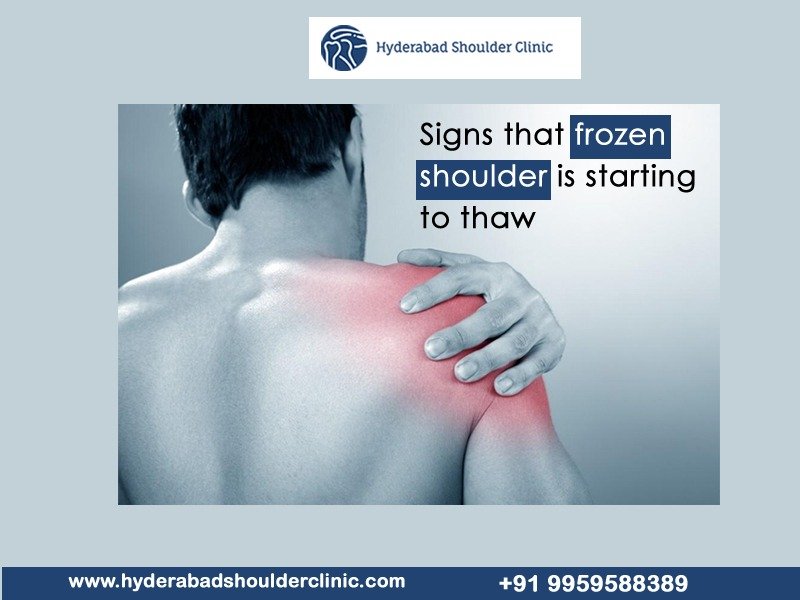The frozen shoulder does not occur in a single day. It is a condition which progresses slowly and in multiple stages. There are three main stages, each lasting weeks, months, or even years. Anyone who is suffering from this condition can know the difficulty of the pain and limited range of motion. One should know the signs and symptoms of the various frozen shoulder phases so that one can better understand their situation and figure out the treatment choices.
There are both surgical and non-surgical solutions to treat frozen shoulder pain. In this blog, we are mainly focussing on how you can tell whether your frozen shoulder is starting to thaw.
What are the various stages of Frozen Shoulder Syndrome?

Frozen shoulder progresses through three stages slowly:
- Freezing Stage
- Frozen Stage
- Thawing Stage
There are clear signs and symptoms for each stage, and each of them has its lifespan. If the symptoms aren’t indicating the stage of shoulder pain, your surgeon might also recommend an X-ray or an MRI.
Understanding Frozen shoulder stages:
The Freezing Stage: This is the first stage, and it can range between two and nine months. This is the most painful stage. Range of motion is limited only to a minor extent initially, so most health practitioners mistake this stage for rotator cuff or bursitis at first sight. With the gradual onset of discomfort and stiffness, the shoulder progresses towards a frozen state. The standard therapies are mostly ineffective, and the symptoms, such as range of motion limits, increase.
The Frozen Stage: By the end of the freezing phase, the shoulder joint becomes frozen. This stage lasts for six months or even a year. The visible symptom is the absence of passive mobility in the shoulder, so it is easy to diagnose at this point. If the patient is unable to extend an arm above, then it is a clear indication of active range of motion loss. In the frozen shoulder stage, even when a physician or physical therapist tries to move the afflicted arm, shoulder mobility is impossible. At this stage, the shoulder adhesions hinder normal shoulder mechanics. One of the positive notes is that most people say that their pain is less intense. However, doing everyday tasks is uncomfortable, leading to arduous ordeals.
The Thawing Stage: The third and final stage of a frozen shoulder is thawing, and it ranges from six months to two years. The good news is that in this last stage, the shoulder capsule will gradually release, and the range of motion will begin to improve. For the shoulder to return to normalcy, adequate medical care is required. Regular physical therapy becomes easier, and the patient can practice stretches. Though this is the final stage, there’s still a long way to go until the patient can move their shoulder without pain or stiffness.
How to know if the shoulder is starting to thaw?

Reduced Shoulder Stiffness: At the beginning of the thawing stage, the frozen shoulder loosens, and it won’t be as stiff as it was. Tension in the shoulder, arm, neck, and back reduce. Since the shoulder tightness reduces, the ability to perform certain movements slowly returns.
Regained Lost Movements: During the previous two stages, whatever movements were lost temporarily will be regained. If they were unable to raise their arms beyond a certain height previously, now they pull off these movements.
Improved Range of Motion: The patient’s range of motion improves progressively, and the individual can once again carry out tasks they were able to perform before the shoulder froze up. They can o arm movements such as forward extension and side stretch, and eventually, will even be able to reach above their head. But the patient should not overdo it as the range of motion improves.
Reduced pain: With limited movement, the patient experiences reduced pain. Earlier, the patient might be experiencing pain in reaching around the body to put on a belt, coat or even comb hair. Though there might be some pain when thawing starts, it gradually diminishes, particularly if it is not used too much.
We at Hyderabad Shoulder Clinic will assist you throughout the frozen shoulder treatment. We will educate you on the precautions to be taken during the thawing phase so that you can continue your normal life once again. For lasting relief please visit our offices sooner to get help from our experienced specialists. Please visit our website https://hyderabadshoulderclinic.com/ or contact us at +91 9959588389, shoulderandsportsclinic@gmail.com





